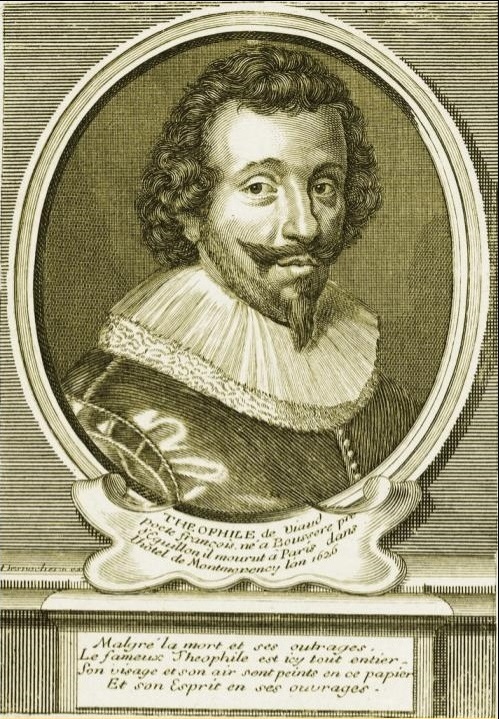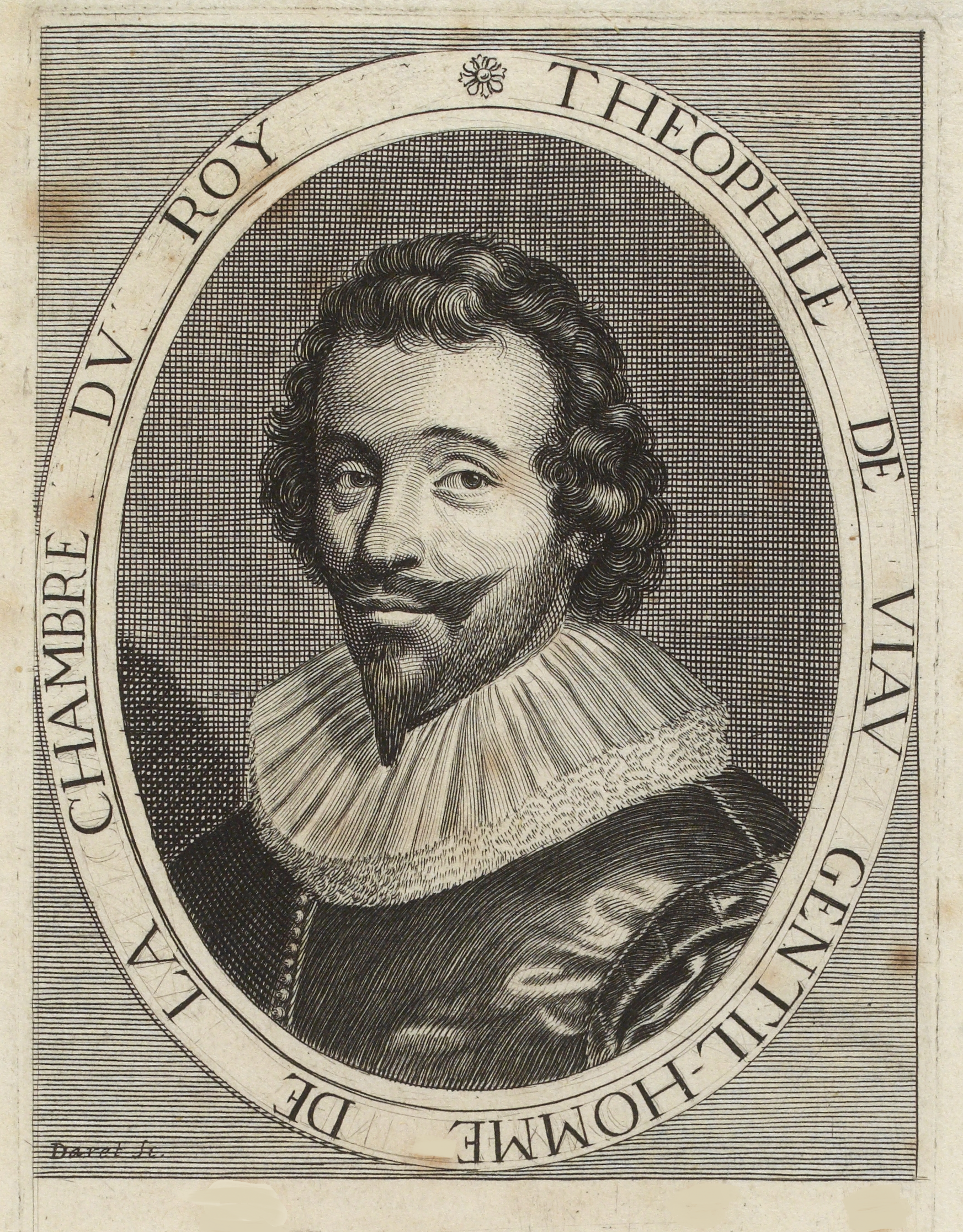1. Overview
Théophile de Viau (1590 - 25 September 1626) was a prominent French Baroque poet and dramatist whose life was marked by significant controversy and persecution. Though widely read during his time, even more so than his contemporary François de Malherbe, he faced severe criticism from 17th-century classicist writers and was largely forgotten. His life was plagued by banishment, imprisonment, and a death sentence, primarily due to accusations of homosexuality and anti-religious views, largely instigated by the Jesuits. However, modern interpretations suggest that these persecutions were more rooted in political rivalries than purely ideological or moral grounds. He was later re-evaluated by 19th-century Romantics and is now recognized as a significant figure in Baroque literature and Libertine thought.
2. Life
Théophile de Viau's life was a tumultuous journey characterized by early religious conflicts, a period at the royal court, and severe persecution that ultimately led to his premature death.
2.1. Early Life and Background
Born in 1590 in Clairac, a town near Agen in the Lot-et-Garonne region of France, Théophile de Viau was raised as a Huguenot. His early life was shaped by the religious tensions of the era, leading him to participate in the Huguenot rebellions in Guyenne between 1615 and 1616, where he served the Comte de Candale.
2.2. Court Life and Early Career
Following his involvement in the rebellions, de Viau received a pardon, which allowed him to enter the royal court. He quickly established himself as a brilliant young poet, gaining recognition for his literary talents. During this period, he was exposed to Epicurean philosophical ideas, notably those of the Italian philosopher Lucilio Vanini. These ideas, which questioned the immortality of the soul, were considered heterodox at the time. Vanini himself was accused of heresy and practicing magic, leading to his brutal execution in Toulouse in 1619, where he was strangled and his corpse burned after his tongue was cut out. This exposure to radical thought further shaped de Viau's own philosophical leanings.
2.3. Persecution and Banishment
De Viau's unconventional views and libertine lifestyle drew the ire of powerful conservative factions. In 1619, he was banished from France due to his perceived heretical ideas and personal conduct, leading him to travel to England. Despite this, he managed to return to the French court in 1620. His troubles escalated in 1622 when a collection of licentious poems, titled Le Parnasse satyrique, was published under his name. Although many of these poems were not his own work, the association fueled further accusations. In 1623, the Jesuits formally denounced de Viau on moral charges, particularly citing his bisexuality and anti-religious sentiments.

He was subsequently imprisoned and sentenced to a public humiliation and execution: he was to appear barefoot before Notre-Dame de Paris in Paris and then be burned alive. While de Viau initially went into hiding, his sentence was carried out in effigy. However, he was eventually apprehended while attempting to flee towards England and was incarcerated in the Conciergerie prison in Paris for nearly two years. His trial sparked widespread public debate among scholars and writers, resulting in the publication of 55 pamphlets both in support of and against him. Ultimately, his death sentence was commuted to permanent banishment from France. Modern interpretations of his persecution suggest that it was less about his actual beliefs or lifestyle and more about political machinations and rivalries within the court and religious institutions.

2.4. Later Life and Death
Following his banishment, Théophile de Viau spent the remaining months of his life under the protection of the Duke of Montmorency at Château de Chantilly. He died in Paris on 25 September 1626, a consequence of the hardships endured during his imprisonment and persecution.
3. Writings and Literary Style
Théophile de Viau's literary contributions are characterized by his unique artistic philosophy, which stood in stark contrast to the prevailing classicist trends of his time. His works encompass plays, various forms of poetry, and prose, all reflecting his independent spirit and preference for natural expression.
3.1. Literary Philosophy and Style
De Viau was a libertine or free-thinker, and his literary philosophy was a direct rejection of the constraints imposed by classicist reformers such as François de Malherbe. While Malherbe laid the groundwork for classical literature, de Viau found the strictures of classical literary rules to be stifling and outdated. He argued that while classical works were once innovative, his contemporaries were merely producing "old literature." He advocated for a "natural and easy" writing style, emphasizing emotional expression and the use of Baroque imagery from the late Renaissance. This disregard for conventional literary constraints contributed significantly to his reputation as a non-conformist. He specifically criticized the "metaphoric excess and lofty erudition" of his contemporaries, while also deeming the constraints proposed by reformers like Malherbe as "sterile."
3.2. Major Works
Théophile de Viau's significant literary output includes a notable tragedy, various poetic forms, and influential prose works.
3.2.1. Plays
His most prominent dramatic work is the tragedy Les Amours tragiques de Pyrame et Thisbé, which was performed in 1621. This five-act tragedy, written in Alexandrine verse, recounts the tragic love story of Pyramus and Thisbe, culminating in a double suicide.
3.2.2. Poetry
De Viau's poetic repertoire included satirical poems, sonnets, odes, and elegies. His poetry often explored themes of melancholy and personal suffering, particularly evident in two of his poems that served as pleas to the king regarding his incarceration or exile. This tone of sadness is also present in his ode On Solitude, which blends classical motifs with an elegy about the poet's experience amidst a forest. Another notable ode is Un corbeau devant moi croasse (Un corbeau devant moi croasseA crow before me cawsFrench), which vividly paints a fantastic scene involving thunder, serpents, and fire, reminiscent of a painting by Salvator Rosa. He also composed La Maison de Sylvie, a series of ten odes dedicated to his patrons.
3.2.3. Prose and Other Writings
Among his prose works, Fragment d'une histoire comique (Fragment d'une histoire comiqueFragment of a Comic NovelFrench), published in 1623, is notable for expressing his distinct literary tastes and his rejection of the prevailing ornate styles. He also authored Traité de l'immortalité de l'âme (Traité de l'immortalité de l'âmeTreatise on the Immortality of the SoulFrench), a work that blends prose and verse, serving as an adaptation of Plato's Phaedo.
4. Reception and Legacy
Théophile de Viau's reception evolved significantly over time, from contemporary criticism and persecution to later re-evaluation and modern scholarly interpretations.
4.1. Contemporary Reception
During his lifetime, Théophile de Viau faced considerable criticism, particularly from the Jesuits and the emerging classicist writers who favored a more structured and restrained literary style. Despite being more widely read than François de Malherbe by his contemporaries, de Viau's non-conformist views and perceived libertine lifestyle sparked intense public debates, especially during his trial. The publication of 55 pamphlets for and against him underscores the contentious nature of his public image and the strong opinions he elicited.
4.2. Later Re-evaluation
After being largely forgotten by the late 17th-century classicist authors who criticized his style, Théophile de Viau was "rediscovered" by the French Romantics in the 19th century. This period marked a significant re-evaluation of his work, recognizing him as an important figure of the Baroque and Libertine literary movements. His emotional depth, rejection of rigid rules, and unique voice resonated with the Romantic sensibilities.
4.3. Modern Interpretations
Contemporary scholarship offers nuanced interpretations of Théophile de Viau's life and persecution. Modern analyses suggest that the severe repression he endured, including his imprisonment and death sentence, may have been driven more by political rivalries and power struggles within the French court and religious institutions than by genuine concerns over his alleged heresy or moral transgressions. This perspective highlights the complex interplay of politics, religion, and personal freedom in 17th-century France, positioning de Viau as a victim of broader societal conflicts.